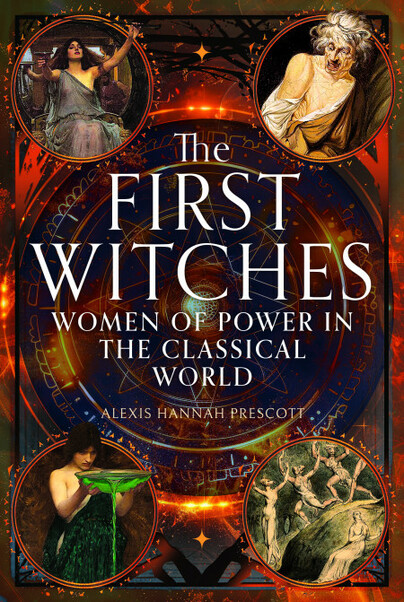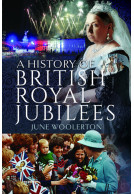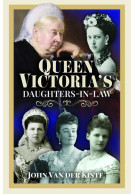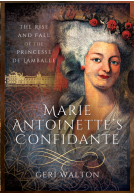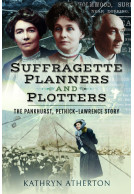The First Witches (Hardback)
Women of Power in the Classical World
Imprint: Pen & Sword History
Pages: 200
Illustrations: 16 mono illustrations
ISBN: 9781399038362
Published: 7th April 2025
(click here for international delivery rates)
Order within the next 9 hours, 41 minutes to get your order processed the next working day!
Need a currency converter? Check XE.com for live rates
The First Witches: Women of Power in the Classical World takes you on a journey into the world of Classical literature, from the adventurous Homeric epic of the Odyssey to the grim warfare of Lucan’s De Bello Civili. In doing so, you will be introduced to a handful of powerful women who will later be labelled as “witches”. The chapters focus upon two specific groups of women from the Graeco-Roman world: the divine Hecate and the formidable yet beautiful Circe, who first feature in Greek texts, and the nefarious Thessalian witches and Erictho, who become marked antagonists in Roman literature. Both Hecate and Circe are fundamentally divine, yet early in their mythologies, they harbour characteristics that will become distinct tropes of witchcraft from being associated with the underworld, lunar lore and dangerous transformative powers. With the onset of increased social tensions in the late Roman Republican to early imperial periods, these divine women become increasingly more demonised within the literature, culminating in Hecate becoming a consort for witches and Circe a seductress and the epitome of the femme fatale.
Simultaneous to these representations, Roman writers adopted a stock character within prose and verse of the hag-witch who was shocking in both appearance and character, displaying many elements of moral turpitude and a disturbing penchant for bestial activities such as cannibalism and the kidnapping and killing of infants. Thus, the hag-witch, most commonly associated with the world of the modern witch hunts and within the pages of modern fairy tale, was born. This book, therefore, provides a readable overview of how the Western witch originated. So profound was the impact of the classical witch upon Western thought and literature that she even lives on today as a prototype of the gruesome woman found in folklore, horror stories and movies. This is why the studying and reading of classical works is so relevant today as it was for our forebears since the literature contains the very ingredients that help to captivate our imaginations and our fears. The authors of the literature and the characters within it will continue to serve as powerful reminders of how the Western world came to be.
The First Witches is thoroughly enjoyable and an unexpected triumph of historical non-fiction.
NetGalley, Róisín M
Alexis Prescott explores the ancient world of witches through a new lens and is incredibly well researched. I loved delving into Greek and Roman texts and was fascinated to learn more about the roots of modern mythology and magical women.
This will greatly appeal to anyone interested in classic literature, but remains very accessible to the average reader... I would definitely recommend this!
There's a lot of books about witch hunts or fantasy witches. There's not so much about the historical witches during ancient times.
NetGalley, Anna Maria Giacomasso
This is well researched and informative.
Recommended.
Rating: 5 out of 5 stars
NetGalley, Lily Amidon
In this incredible exploration of women and witches in classical literature, Prescott delves into ancient texts from Homer’s Odyssey to Lucan’s De Bello Civili to understand how the archetype of the “witch” evolved from the divine figures of Hecate and Circe to the Thessalian witches and Erictho in Greek and Roman literature. Exploring the changes between Greek texts and Roman ones, Prescott argues that the hag-witch stock character from Roman literature became the basis for subsequent depictions of witches in medieval and modern texts -- the figure associated with witch hunts and fairy tales. Only by understanding this evolution and the impetus behind the Roman archetype, Prescott argues, can the modern depictions of witches across media genres be truly understood. A complex and brilliant argument, the literary and cultural analysis here offers readers fascinating insights into a plethora of texts, and Prescott really engages readers with the original documents in some fascinating ways. Perfect for scholars of media studies, classics, and literature, this easy to read and interdisciplinary book really pulls readers into the various texts and the archetype because the details are so complex and intricate. Brilliantly written and entertaining, this is a fantastic multi-discipline book that many readers will enjoy for the great writing and detailed analysis.
Rating: 5 out of 5 stars
NetGalley, Kathryn McLeer
I really enjoyed getting to learn about these witches in literature, it was a engaging read and was everything that I wanted from the first page. It had that research that I was hoping for and enjoyed the overall feel of this. Alexis Prescott has a strong writing style and was glad I got to read this.
Rating: 5 out of 5 stars
NetGalley, Andrea Romance
This book traces the evolution of the witch archetype in Classical literature, from the divine figures of Hecate and Circe in Greek texts to the demonized witches of Roman literature. It explores how these literary representations shaped the Western conception of witchcraft, influencing folklore, horror, and popular culture to this day.
This book does a great job of showing how the ancient concept of female power was twisted into a malign influence by the patriarchal Roman Empire. The main focus is on literary portrayals rather than on the persecution of real people. The book is engaging, informative, and easy to read.
Absolutely wonderful and informative read, I’m always interested in the burning (and persecution ) of women (and men) for being educated, free spoken or intelligent and not going with the majority, I loved this and I’m really glad I got to read this.
NetGalley, Tara Keating
Loved this book! The concept of something typically thought of as "fantasy" connected to the world of old and the world of today! Love the historical aspect of it and the insight of how, in many ways, things have not changed in regards to how women are viewed. Even as far back as Ancient Greece and Rome.... Highly recommended!
NetGalley, Joan Blendowski
The First Witches: Women of Power in the Classical World by Alexis Hannah Prescott is a fascinating and insightful exploration of the origins of the Western witch, the development of the witch archetype and its legacy.
NetGalley, Sophie V
Prescott considers powerful women from Classical literature beginning with the divine figures of Hekate and Circe as depicted in Ancient Greek literature and then traces the gradual metamorphosis of these figures into shadowy, antagonistic, demonised symbols of horror, providing thoughtful analysis of the depiction of 'witches' in classical Roman literature. In addition to evaluating the textual evidence, of which there is a wide array, Prescott also examines the historical and social contexts which contributed to these negative depictions and demonstrates the enduring impact these have had on the Western world.
Written in a concise and engaging manner and obviously very well researched (the footnotes, appendices and the extensive list of primary and secondary sources are fantastic), the book is very immersive and readable. Having read and studied many of the works the author uses as examples throughout, I didn’t learn as much as I hoped I would, however, I still enjoyed the book and am so happy to see this particular subject area being explored more.
I would recommend this book to someone delving into Classical literature for the first time, to readers who have a keen interest in history, mythology and folklore as well as to students who are studying classical works such as The Odyssey, Medea or even the more modern feminist retellings of the Greek myths in order to enhance their learning.
Rating: 5 out of 5 stars
NetGalley, Gemma Turley
*First Witches* is a fascinating, accessible, and thoroughly engaging exploration of powerful women in ancient mythology and literature—and how they became the blueprint for the Western concept of the “witch.” Alexis Hannah Prescott takes readers on a journey through the classical world, spotlighting figures from epic poetry and ancient texts who challenged patriarchal norms and paid the price through vilification and myth-making.
What makes this book such a compelling read is its clarity. Prescott writes in a way that is intelligent but never alienating, managing to explain complex ideas without overloading the reader. Even if you’ve never picked up *The Odyssey*, you'll find the stories of Circe, Medea, and others both digestible and eye-opening. While I recognized a few of the figures featured, many were new to me—and each one was introduced with sharp insight and care.
The book’s structure is another of its strengths. It’s easy to follow and well-organized, which makes it perfect for dipping in and out or reading straight through. By the end, I found myself inspired to return to epic poetry and explore the ancient texts Prescott references—her enthusiasm is genuinely infectious.
One of the most powerful elements of *First Witches* is how it shines a light on the way classical literature has been used to minimize women. Prescott draws a clear and thought-provoking line between ancient misogyny and modern ideas of femininity and fear. The portrayal of witches, she argues, often stems from a male-dominated need to control and suppress female autonomy—something that still echoes in modern representations today.
Well-researched and packed with information, this book never feels dry. Instead, it’s a dynamic and important read that blends scholarship with storytelling in the best way. Whether you're a classics enthusiast or simply fascinated by the idea of witches in history, *First Witches* is a must-read. It’s the kind of book that stays with you—and makes you look at ancient stories, and our own society, a little differently.
The First Witches stands as a worthwhile examination of early, influential witch and deity characterizations, their transformations, and social forces that affect Western representations of female power. The excellent cover, extensive research, and appealing premise will no doubt please readers interested in witches in Western culture.
NetGalley, Jayce Torben
I recommend it for readers interested in witches, mythology, the Classical era, history, gender studies, and literature. Horror readers will find early instances of extreme, disturbing scenes that continue to arouse fear. Writers and anyone intrigued by archetypes, poison, potions, and Emperor/state tactics against women will find an abundance of provocative imagery and signs of resistance.
Rating: 5 out of 5 stars
NetGalley, Joanne Ellis
Alexis Prescott’s The First Witches is an illuminating and engaging deep-dive into the origins of one of the most enduring archetypes in Western culture: the witch. Far from being a mere historical catalog, this book offers a rich, literary and cultural exploration of how ancient portrayals of divine and magical women evolved into the monstrous figures that still haunt modern imaginations.
Prescott leads the reader through the Classical canon, beginning with the beguiling Circe and shadowy Hecate in early Greek literature, before tracing their transformation through Roman texts into increasingly demonized figures. These women, once portrayed as goddesses or magical figures associated with wisdom, nature, and power, gradually became symbolic of fear, transgression, and otherness—elements that would fuel the witch stereotypes of the medieval and early modern worlds.
The book is particularly strong in its analysis of literary texts, with careful attention to how historical context shaped changing perceptions of female power. Prescott connects myth to politics with a deft hand, showing how late Republican and Imperial Roman anxieties—especially around civil strife, gender roles, and morality—fed the evolution of the witch figure. The grotesque hag-witch of Roman literature, exemplified by the terrifying Erictho and the Thessalian necromancers, emerges as a prototype for the witches of fairy tales, Gothic horror, and modern media.
One of the book’s greatest achievements is its accessibility. Prescott writes with clarity and enthusiasm, offering both academic insight and narrative flair. Readers without a background in Classics will find the material approachable, while scholars will appreciate the depth of analysis and the careful sourcing.
Ultimately, The First Witches is more than a study of mythological figures—it’s a meditation on how societies react to female power, especially when it challenges established norms. In tracing the arc from divine enchantress to malevolent crone, Prescott uncovers the roots of cultural fears that still shape gendered narratives today.
Verdict:
A captivating and thoughtful study, The First Witches reveals how ancient literature birthed the witch as we know her—dangerous, powerful, and unforgettable. A must-read for anyone interested in mythology, gender studies, or the dark side of cultural memory.
A fascinating overview of notable witches from antiquity. The author offers some nice insight to the history of witches and how our view of them has developed throughout history.
NetGalley, Abigail Paige
Rating: 5 out of 5 stars
NetGalley, Lauren B
This book was such a cool book to read! I really loved the way the author explored and took the reader through history exploring the evolution of witches as they are portrayed throughout literature. I really liked the way the author brought in not only the portrayals of the characters themselves, but also the way that the political landscape at the time influence those portayals and depictions.
While a short book, this was so engaging, and I basically sped through it finding new things and changing my own views and understanding of how culture was shaped and how it impacted Western literature and culture.
I highly highly highly recommend this book to anyone who is interested in culture, history, classical history, or witchcraft in general.
Witchcraft is a topic that has fascinated me for a long time. So much of the media around witches focuses on witches from Medieval times. This book is a brilliant introduction to ancient witches. A captivating and well-researched book rooted in ancient sources, combined with references to modern pop-culture.
NetGalley, Rowan Brennan-Jesson
Really fantastic to see a book about witches that focuses on classics - though citation heavy (which is not necessarily a bad thing), this was still digestible and not just a history of witches, but an investigation into what *makes* them witches. Prescott has a wonderful writing style, balanced well between storytelling and academic tone.
NetGalley, Bertie Cunningham
This book was such an interesting read! We rarely encounter a non-fiction solely based on this topic. It has a lot of information that will give the reader more context on famous witches from classic literature.
NetGalley, Armina Fonacier
There were witches from different references - Roman, Greek and many more. This shows diversity of the craft and I really enjoyed the comparison among them. I must say, this is a good reference itself or a guide.
I believe this would be an excellent book for recommended reading for classes on Greek and Roman literature, or one on views of women in that time period.
NetGalley, Sharon Custer
Rating: 5 out of 5 stars
NetGalley, Neveen Badr
In *The First Witches*, Alexis Prescott embarks on a bold and eloquent reclamation of ancient womanhood, tracing the earliest archetypes of the witch through the classical traditions of Greece and Rome. Far from sensationalism, this work is a meticulously researched and culturally resonant examination of how women—mystics, healers, sibyls, and seers—became entwined with the language of power, fear, and the supernatural.
Prescott's central argument is both timeless and timely: that the image of the "witch" is rooted not in fantasy, but in a long-standing cultural discomfort with female autonomy, intellect, and spiritual authority. Drawing from classical literature, historical sources, mythology, and early philosophical texts, she excavates the legacies of figures such as Medea, Circe, and Hecate, placing them alongside real women accused of—or revered for—possessing esoteric knowledge.
The writing is clear and evocative, rich in historical detail while also accessible to readers outside of classical studies. Prescott does not merely recount stories; she interprets them, interrogating the cultural forces that shaped the portrayal of these women as dangerous, seductive, or subversive. In doing so, she draws a powerful through-line between ancient suspicions and later witch persecutions, revealing a continuity of patriarchal anxiety surrounding female power.
Of particular merit is the author's sensitivity to ambiguity. She resists reducing her subjects to modern labels or flattening their complexity. These women are neither romanticized as feminist icons nor dismissed as mythic curiosities—they are studied as dynamic agents within their own cultural and religious contexts. Their magic, often tied to herbal knowledge, liminality, or prophecy, becomes a site of both empowerment and marginalization.
**Final Verdict**:
*The First Witches* is an incisive and beautifully argued contribution to the history of women, belief, and authority. Alexis Prescott casts new light on ancient narratives and, in doing so, challenges enduring assumptions about gender and spiritual legitimacy. A must-read for scholars of classical history, mythology, gender studies, and all readers intrigued by the origins of the witch as a cultural figure.
Rating: 5 out of 5 stars
NetGalley, Erin Diane
Exactly what I have been wanting - the history of witches from the Bible and various areas of mythology. Pieced together in a way that begs to be re-read and annotated a few times over. I desperately need a physical copy of this for that reason.
Rating: 5 out of 5 stars
NetGalley, Chelsea Dugan
Witchcraft, power, and mythology—this was absolutely my kind of read.
This book hit all the right notes for me: rich in classical history, sharp in its analysis, and deeply engaging. The First Witches explores how figures like Hecate, Circe, and the infamous Thessalian witches evolved from divine or mystical beings into the terrifying, grotesque hag-witch stereotype we’re still haunted by today. Alexis Prescott does a fantastic job showing how these women were transformed through literature and social anxiety into cautionary tales—and how those archetypes still echo in modern pop culture.
I really appreciated how accessible this was. Prescott clearly knows her classics, but the writing never gets bogged down in academic jargon. She balances deep literary analysis with strong storytelling, making it easy to follow even if you’re not an expert in ancient texts.
The sections on Erictho and the Roman hag-witch trope were especially striking—how quickly divine power gets twisted into monstrosity when it threatens the status quo. It’s both fascinating and infuriating to see how enduring these patterns are.
If you’re interested in mythology, the history of witchcraft, or just powerful women being reinterpreted (and often vilified) across centuries, this is a must-read. Thought-provoking, well-researched, and genuinely compelling.
I think this was a really interesting dive into the early days of witches and witchcraft... Looking forward to seeing more from this author in future on historical topics!
NetGalley, Krystelle Fitzpatrick
Rating: 5 out of 5 stars
NetGalley, Books Tea Magic
Absolutely brilliant! A well researched and comprehensive historical representation in a highly readable format that’s brimming with details and overflowing with all manner of witch information and depictions. While this is not a book about Salem, MA, I did grow up in that area and perhaps that’s why I voraciously devour all types of books on witches. This one was refreshingly different and incessantly compelling in an academic and literary way. Fascinating stuff I loved every minute of it!
Rating: 5 out of 5 stars
NetGalley, Mona M
It’s probably no shock that I love reading about classical history. And witches. So, when I came across The First Witches by Alexis Prescott, I just knew I had to read it. And let me tell you, it absolutely delivered.
This book takes you through history exploring the evolution of witches, who they are and how they were portrayed in literature. From the Illiad and the Odyssey, through Metamorphoses and Macbeth to The Wonderful Wizard of Oz, the book not only highlights key references but also compares the witches in question to show how socio-political influences shaped their depictions. Then, it dives into how all of this has impacted Western literature, and the Western world in general.
Even though I was familiar with some of the arguments the book presents, the way it lays everything out is both informative and super accessible. It felt like it was organizing my own thoughts, introducing me to more details and making everything click in a whole new way. And all in under 200 pages!
Plus, the footnotes and the references section are extensive and provide with even more resources and books to dig into!
All in all, I adored this book. So much so that I found myself thinking about it while watching several movies recently!
Rating: 5 out of 5 stars
NetGalley, Andreea Maria Cimpoeru
If, like me, you are interested in the history of witches then you must give this book a try. I love anything witchcraft related and this detailed piece of non-fiction helped me place many of the famous witches from classical literature. This will give a lot more context to all the retellings I am reading
There are references to witches in classical literature including Homer’s “Iliad” and “Odyssey”, Ovid’s “Metamorphoses”, Vergil’s “Aeneid”, Shakespeare’s “Macbeth”, L. Frank Baum’s “The Wonderful Wizard of Oz” and more. As for the witches themselves there are references to Medea, Circe, Hecate, Erichtho, as well as Baba Yaga and so many more.
I enjoyed the comparison of how witches were regarded in classical Greek literature as opposed to classical Roman literature, and the impact they have had on the Western World.
There are even references to witches in modern film.
Because of the richness of information I will probably have to reread it, since I won’t be able to retain all the information on these interesting women’s stories for long. This is why I think this book can be used as a reference guide, something to constantly return to.
Further, I like the presence of foot notes and an extensive sources section in non-fiction, especially anything pertaining to witchcraft because it allows me to look up a lot more information regarding the subject and it shows all the research that went into writing the book.
Rating: 5 out of 5 stars
NetGalley, Katherine McCrea
The First Witches is a fascinating look through history and classical literature studying the lineage of witches in history. If you're interested in women's history and the history of witches, I highly recommend this book. It was a fascinating look at some familiar and unfamiliar tales.
I have always been fascinated with witches and so when I saw this I knew it would be a fascinating read. It was very well researched without being too heavy on the facts and was such an interesting read.
NetGalley, Kirsty Montgomery
Rating: 5 out of 5 stars
NetGalley, Karen Bull
Great book.
As someone who found later in life that my family has witches in our past and current it always fascinated me.
Especially when none of us knew of the past yet able do things that sadly centuries ago people would been hounded for.
It's sad history that has happened and good find book that reflects this.
About Alexis Prescott
Alexis Prescott holds a BA and MA in Ancient History and a PGCE in Classics from King’s College London. After her master's, she worked as a cataloguer of Roman Republican coins at the British Museum for three years before moving into teaching. She has since been a Classical Civilisations, Latin and Ancient Greek teacher for over 16 years, working as Head of Classics in a prep school and two secondary schools. She is now a freelance private tutor. As a Classics teacher, she has specialised in the teaching of Ancient Greek and Roman epic poetry, Greek tragedy, the Athenian democratic system, Roman Republican history and early Roman imperial history. Alexis is passionate about the representation of folkloric figures in the Classical world and the influences these representations have had upon Western thought, literature and film. She currently resides in the Northeast of England with her son.







